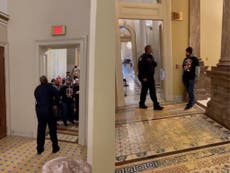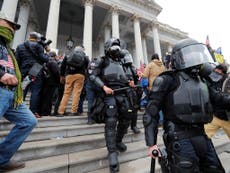The Independent's journalism is supported by our readers. When you purchase through links on our site, we may earn commission.
The Capitol riot is part of a growing battlefield – the ‘grey zone’
This worrisome form of combat will continue to affect many lives

Your support helps us to tell the story
From reproductive rights to climate change to Big Tech, The Independent is on the ground when the story is developing. Whether it's investigating the financials of Elon Musk's pro-Trump PAC or producing our latest documentary, 'The A Word', which shines a light on the American women fighting for reproductive rights, we know how important it is to parse out the facts from the messaging.
At such a critical moment in US history, we need reporters on the ground. Your donation allows us to keep sending journalists to speak to both sides of the story.
The Independent is trusted by Americans across the entire political spectrum. And unlike many other quality news outlets, we choose not to lock Americans out of our reporting and analysis with paywalls. We believe quality journalism should be available to everyone, paid for by those who can afford it.
Your support makes all the difference.“There’s a maxim that if you want to boil a frog, you don’t just drop it into boiling water, because it’ll jump straight out again”, Lieutenant General Sir Graeme Lamb explains. “You put it in cold water and you slowly bring the water up to boil. By the time the frog realises it’s getting too hot, it’s lost the energy to be able to jump out. We’re being boiled like a frog.”
The analogy, by the former director of UK Special Forces, was about how western democracies are under attack – with values and institutions being undermined and communities driven to turn on each other by the secrets and lies of poisonous propaganda.
This is the “grey zone”, an arena of conflict without conventional weapons, but one which poses a great threat. One saw its devastating effects during the storming of the Capitol in Washington last week, carried out by a mob many of whom have been influenced by theories of QAnon and other extremist groups on websites, some of it with Russian input. They were fighting a jihad on behalf of Donald Trump, who was helped to the White House by information manipulation by the Kremlin.
“Our opponents will have found a way to unravel our democracy from inside, our freedom, our way of life, and all the things that we have. They may not have to commit a gun or tank, they could have done it using proxies done it through cyber,” according to the the chief of defence staff, General Sir Nick Carter, describing the broader frontiers of this kind of strife, and the reach it can have. The defence secretary, Ben Wallace, said that a society can be fractured through cyberwarfare and misinformation through proxies, “and then, if you did want to drive one day with your armoured brigade, there’s not much to get in the way.”
Mark Sedwill, the former cabinet secretary and national security adviser, points out that the “particularly worrisome nature of the ‘grey zone’ is that you don’t necessarily spot what’s happening until you realise the accumulation of attacks, the accumulation of efforts to undermine people’s confidence in their institutions and the western democratic system ... You don’t realise that that has been undermined until it’s already happened because it’s an accumulation of small actions...”
The four men were speaking on Into The Grey Zone, a podcast by Deborah Haynes, foreign affairs editor of Sky News. I have met three of them in more overt conflicts: Haynes, a fine and brave journalist, in Iraq; Lamb in Iraq and Afghanistan; and Carter and Sedwill in Afghanistan. Wallace, while in the army, had served in Northern Ireland.
The Iraq War is a reminder that the west too uses propaganda: we can recall the fake reports of Saddam Hussein’s supposed arsenal of weapons of mass destruction. And denigrating those, including journalists, who question a false official narrative is not something restricted to the Trumps, Vladimir Putins and Xi Jinpings of this world.
I recall colleagues and I who were in Iraq in the run-up to the invasion attacked by Downing Street spinmeisters for casting doubts on the “dodgy dossier” – falsely claiming that Iraq had chemical and biological weapons – produced by Tony Blair’s government to justify going to war.
Misinformation, in a much more limited scale, was used by the US to influence the public in the first Gulf War, with a fake “eyewitness interview” of Iraqi troops removing babies out of incubators while looting at a hospital and fake claims that Saddam was massing troops at the Saudi border.
What is new now, perhaps, is the structured weaponising of misinformation. Moscow has sought to interfere in western elections and referendums. Internet groups with links to Russia and China have spread fake conspiracy theories about coronavirus. One result of this is a confluence of extremism with the hard right and the hard left parroting bogus anti-mask, anti-vaccine, anti-5G claims.
At what point in the “grey zone” is there a direct physical attacks by a foreign state? The novichok poisoning of Sergei and Yulia Skripal, according to the podcast, is such a case in point.
Haynes travels to Salisbury with Marina Litvinenko, who recalls the killing of her husband Alexander 14 years ago in London. She speaks movingly about her loss, for which the perpetrators have not faced justice. That will also be the case, one feels, about the ones responsible for the novichok poisoning.
The aftermath of the Salisbury attack showed, however, that “grey zone” operations are not always sleek, but can be marked by ineptitude. The attack failed to kill Sergei Skripal, and claimed the life of Dawn Sturgess, a resident of the city unconnected with Russia, months later.
The two officers in Russian military intelligence (GRU) suspected of carrying out the attack, Anatoliy Chepiga and Alexander Mishkin, were identified relatively quickly by the investigative website Bellingcat, along with Russian investigative journalists. Then came their risible appearance on Russian TV when they claimed they had travelled to Britain as tourists just to see Salisbury Cathedral, trotting out the charms of it with large chunks from Wikipedia. Whose bright idea in the Kremlin’s intelligence hierarchy, one wonders, was to allow them to appear in that car-crash interview?
So we have misinformation, attempted murder and unintended satire all in one case. But just how widely can one stretch the “grey zone” parameters?
Do the lies told by Leave campaigners in the EU referendum – “£350m a week for the NHS”, “80 million Turks able to come to the UK” etc – which help them win, qualify? Brexit did, after all, play to Putin’s supposed desire to split western alliances. And, as a major tome just published by Chatham House is the latest to point out, this leaves the UK facing massive political, diplomatic and economic challenges with the prospect of a diminished “special relationship” with the US under Joe Biden’s administration.
The “grey zone” is going to continue as a potent means of hybrid combat and will affect many lives. Haynes’s podcast, which will continue with eight more episodes, is of great value in our attempts to fathom this dynamic and dangerous battlefield.



Join our commenting forum
Join thought-provoking conversations, follow other Independent readers and see their replies
Comments